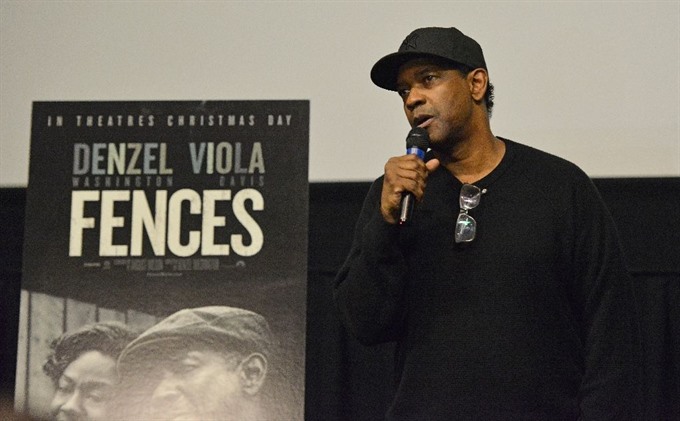 Life & Style
Life & Style

Voting members of the Academy of Motion Picture Arts and Sciences gave nods to six black actors, including two-time Oscar winner Denzel Washington in the best actor category for his performance in Fences, an adaptation of a play about a working-class African American family in 1950s Pittsburgh.
 |
| Two-time Oscar winner Denzel Washington has been nominated for best actor for his role in "Fences", a film about a working-class African American family in 1950s Pittsburgh. — AFP File Photo |
LOS ANGELES — Hollywood appeared to breath a collective sigh of relief on Tuesday as a record number of black actors were nominated for Oscars, averting a repeat of last year’s diversity controversy.
Voting members of the Academy of Motion Picture Arts and Sciences gave nods to six black actors, including two-time Oscar winner Denzel Washington in the best actor category for his performance in Fences, an adaptation of a play about a working-class African American family in 1950s Pittsburgh.
Ruth Negga, who is Irish-Ethiopian, was nominated in the best actress category for "Loving," the real-life story of an interracial couple in mid-20th century America, when some states banned such unions.
Mahershala Ali and British actress Naomie Harris were first-time nominees in the best supporting actor and actress categories for "Moonlight," the coming-of-age tale of a black man in Miami.
Two-time nominee Viola Davis is also in the running for best supporting actress for her performance in Fences, as is Oscar winner Octavia Spencer for Hidden Figures, the real-life tale of NASA’s black female mathematicians.
Four of the five documentaries honored by the Academy -- including Ava DuVerney’s 13th and I Am Not Your Negro by Raoul Peck -- were by black filmmakers.
"This is not necessarily a message," said Academy president Cheryl Boone Isaacs, commenting the list. "It really has to do with the talent. Each year, we recognize talents and films of a particular year. And this year has been just fabulous."
Isaacs vowed major changes last year after another crop of all-white nominees prompted calls for a boycott and widespread outrage on social media under the hashtag #OscarsSoWhite.
Many of the Academy’s long-nonworking and mostly white male members had their voting privileges revoked and more women and minorities were invited to join.
Given this year’s nominations, the #OscarsSoWhite controversy is not likely to dog the 89th Academy Awards being held on February 26 in Los Angeles.
"We marched on the Oscars last year. This year the nominations reflect a real, concrete view of what America cinema really looks like," civil rights leader Al Sharpton, who led a rally against the Oscars ceremony last year, said in a tweet.
’Color has no relevance’
Shaun Harper, executive director of the University of Southern California’s new Race and Equity Center, said it was clear the Academy’s nearly 6,700 voters had an "extraordinary" group of contenders to pick from.
"Moonlight for example was an incredible film with an all-black cast," said he.
He added that beyond the quality of actors and movies, Academy members were likely more conscious of black talent in the industry in light of the uproar of past years.
"I hope this is not the last year that we see an uptick in the nominations with black actors, and that we see it year after year," he said.
"I hope it doesn’t take another digital campaign to get the Academy to recognize there are people of color who deserve a nomination and recognition."
Ali, who plays a warm-hearted drug dealer with a paternal streak in Moonlight and who became a household name for his role on the Netflix drama House of Cards, welcomed the Oscars accolade, but hoped he didn’t get it just for being black.
"That has no relevance," he told The Hollywood Reporter. "I hope I was nominated for my work."
And while Hollywood may be patting itself on the back for honoring black actors this year, many in the industry and beyond are warning that the diversity push should not stop there.
The only other minority actor nominated in the lead categories on Tuesday was Dev Patel, who is of Indian descent, for his role in Lion.
"Hollywood’s diversity problem isn’t solved. By many measures, it’s still as bad as ever," the Los Angeles Times said in an editorial.
"And the studios’ biggest minority deficit by far involves the very people living and working outside their walls in virtually every direction -- Latinos." —AFP




